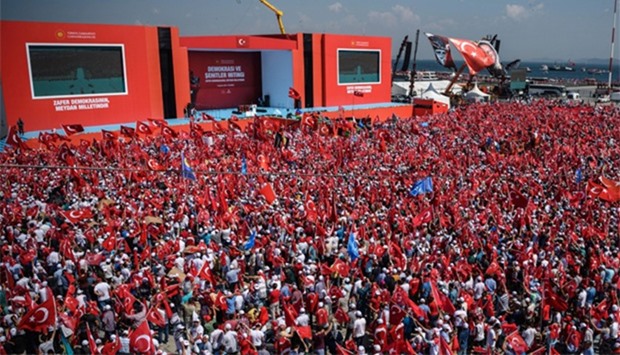Television images showed Erdogan's presidential helicopter landing at the site of the rally in the district of Yenikapi on the Sea of Marmara coast on the European side of the city.
Hosted by Erdogan, the ‘Democracy and Martyrs' Rally’ is expected to be the largest demonstration since the July 15 coup, which was averted in no small part by citizens who took to the streets to block the rogue soldiers.
It will be attended by the ruling conservative Justice and Development Party (AKP), along with two opposition parties - the right-wing Nationalist Movement Party (MHP) and centre-left Republican People's Party (CHP).
The head of the CHP and leader of the opposition, Kemal Kilicdaroglu, and MHP chief, Devlet Bahceli, both accepted Erdogan's invitation to attend the rally.
The pro-Kurdish Peoples' Democratic Party (HDP), the third largest party in parliament, was not invited, as Erdogan accuses it of ties to the banned Kurdistan Workers' Party (PKK).
From the outset all parties in parliament opposed the coup, which left at least 260 people dead and prompted the government to announce a state of emergency. Erdogan blames his former ally turned arch enemy Fethullah Gulen for organizing the coup.
All three opposition parties also voiced concern that they were not consulted about structural reforms for the armed forces, including bringing them under more civilian control.
Some opposition members and rights groups like Amnesty International have also expressed worries about human rights violations and abuses of power in recent weeks.
The Turkish authorities said more than 60,000 government workers have been suspended or fired in the wake of the coup as it purges alleged supporters of Gulen. Some 20,000 teachers have also lost their licences.
More than 25,000 people have been detained, over 13,000 of whom have been formally arrested.
Gulen - a Turkish-born Islamic cleric living in self-imposed exile in the United States since 1999 who has a large global following which runs schools, businesses and charities - denies the charges.
Critics of Erdogan, many of whom warned about the Gulenist movement for years, say the ruling party helped place followers of the cleric into the state bureaucracy. They then used these position to carry out the coup, they say. Erdogan himself has admitted he was fooled by Gulen.
Turkish officials are demanding Gulen's extradition, but no official request has been filed to the United States. The matter is causing tensions in the relations between Ankara and Washington.

